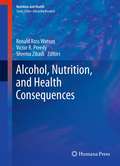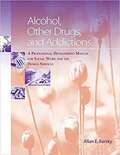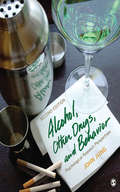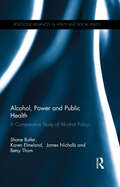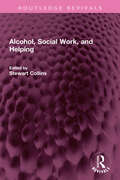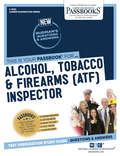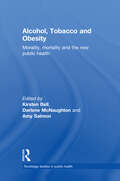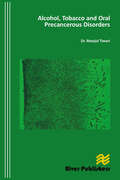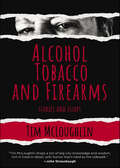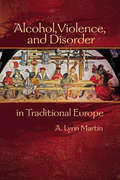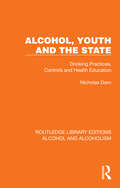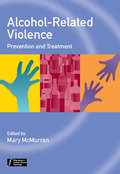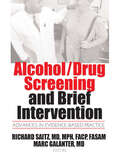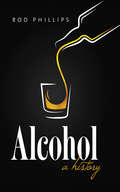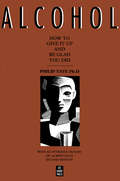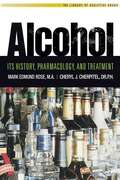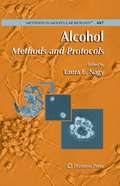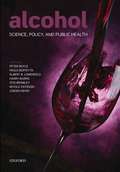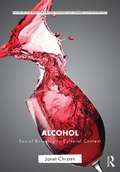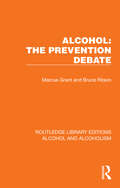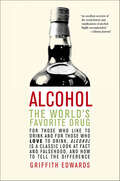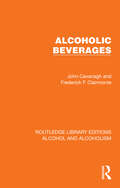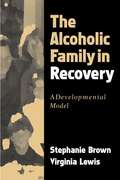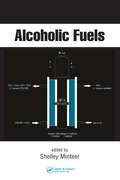- Table View
- List View
Alcohol, Nutrition, and Health Consequences (Nutrition and Health)
by Victor R. Preedy Ronald Ross Watson Sherma ZibadiChronic alcohol use is associated with heart, liver, brain, and other organ pathology. Alcohol is a drug of abuse and a caloric food and it causes poor intake and absorption of nutrients, thus playing a major role in many aspects of clinical consequences. Alcohol use lowers consumption of fruit and vegetables, lowers tissue nutrients, and, in some cases, requires nutritional therapy by clinicians. Alcohol, Nutrition, and Health Consequences will help the clinician define the causes and types of nutritional changes due to alcohol use and also explain how nutrition can be used to ameliorate its consequences. Chapters present the application of current nutritional knowledge by physicians and dietitians. Specific areas involving alcohol-related damage due to nutritional changes are reviewed, including heart disease, obesity, digestive tract cancers, lactation, brain function, and liver disease. In addition, alcohol's effects on absorption of minerals and nutrients, a key role in causing damage are treated. The importance of diet in modifying alcohol and its metabolite damage is also explained. Alcohol, Nutrition, and Health Consequences is essential reading for alcohol therapists and researchers as well as primary care physicians and dietitians and is an easy reference to help the clinician, student, and dietitian comprehend the complex changes caused by direct and indirect effects of ethanol at the cellular level via its nutritional modification.
Alcohol, Other Drugs and Addictions: A Professional Development Manual for Social Work and the Human Services
by Allan Edward BarskyTo help prepare you for the realities of working with clients affected by addictions, this beneficial text provides you with the necessary tools needed to competently translate addictions theory into practice. It offers a thorough examination of a range of models and perspectives for helping, and it encourages critical thinking to best match approaches with clients and situations. Presented in a work-text format, this book is full of cases, exercises, role-plays, and questions to increase your understanding of concepts and application to practice.
Alcohol, Other Drugs, and Behavior: Psychological Research Perspectives
by John R. JungProviding a psychological perspective on the use and abuse of alcohol and other psychoactive drugs, this Second Edition includes more coverage of the theories of alcohol and other drug use and abuse, as well as broad conceptual issues related to the nature of addiction and recent developments in research methods.Key FeaturesFocuses on alcohol, which is used more widely than any other drug, and the one that is associated with the most societal harmEvaluates important studies on major issues, concepts, and theories rather than providing exhaustive literature reviewsTeaches students to become educated consumers of research findings, rather than passive or uncritical recipientsAncillariesA Student Study Site with chapter summaries, multiple-choice quizzes, flashcards for glossary items, an annotated list of relevant Web sites, informational QuickTime movies, and SAGE journal articles.A password protected Instructor′s Resource Site includes PowerPoint slides and test questions.Intended AudienceThis text is appropriate for upper-level undergraduate courses in Drugs and Behavior, Psychology of Addiction, and Drug Abuse Counseling. It can also be used in graduate-levelcourses in Drugs and Behavior and Addiction courses taught in health science, social work, criminal justice, and nursing.
Alcohol, Power and Public Health: A Comparative Study of Alcohol Policy
by Shane Butler Betsy Thom James Nicholls Karen ElmelandIn recent years, the reduction of alcohol-related harm has emerged as a major policy issue across Europe. Public health advocates, supported by the World Health Organisation, have challenged an approach that targets problem-drinking individuals, calling instead for governments to control consumption across whole populations through a combination of pricing strategies, restrictions on retail availability and marketing regulations. Alcohol, Power and Public Health explores the emergence of the public health perspective on alcohol policy in Europe, the strategies alcohol control policy advocates have adopted, and the challenges they have faced in the political context of both individual states and the European Union. The book provides a historical perspective on the development of alcohol policy in Europe using four case studies – Denmark, England, Scotland and Ireland. It explores the relationship between evidence, values and power in a key area of political decision-making and considers what conditions create – or prevent – policy change. The case studies raise questions as to who sets policy agendas, how social problems are framed and defined, and how governments can balance public health promotion against both commercial interests and established cultural practices. This book will be of interest to academics and researchers in policy studies, public health, social science, and European Union studies.
Alcohol, Social Work, and Helping (Routledge Revivals)
by Stewart CollinsFirst published in 1990, Alcohol, Social Work and Helping provides coherent and imaginative advice on how to counsel the growing number of clients whose use of alcohol causes of problems. It locates intervention within societal and agency contexts and tackles such practical issues as: how to work with a problem drinker; which short-term goals to suggest; what kind of help to apply; and how to assist in the event of a relapse. The contributors, with backgrounds in academic, statutory, and voluntary settings, focus on key areas of intervention, family, and group contexts, and there is a chapter on the particular circumstances and needs of women. All relevant information – both general and specialized – is presented in a clear, easy-to-read style, and is aimed at developing existing knowledge and skills. This book will be of interest to students of health, social work, and sociology.
Alcohol, Tobacco & Firearms: Passbooks Study Guide (Career Examination Series #C-39)
by National Learning CorporationThe Alcohol, Tobacco and Firearms (ATF) Inspector Passbook® prepares you for your test by allowing you to take practice exams in the subjects you need to study. It provides hundreds of questions and answers in the areas that will likely be covered on your upcoming exam, including but not limited to: Investigation and inspection methods; Reading comprehension; Proper usage of vocabulary and grammar; Arithmetic reasoning; Graphs, charts and tables; and other related areas.
Alcohol, Tobacco and Obesity: Morality, mortality and the new public health
by Amy Salmon Kirsten Bell Darlene McNaughtonAlthough drinking, smoking and obesity have attracted social and moral condemnation to varying degrees for more than two hundred years, over the past few decades they have come under intense attack from the field of public health as an 'unholy trinity' of lifestyle behaviours with apparently devastating medical, social and economic consequences. Indeed, we appear to be in the midst of an important historical moment in which policies and practices that would have been unthinkable a decade ago (e.g., outdoor smoking bans, incarcerating pregnant women for drinking alcohol, and prohibiting restaurants from serving food to fat people), have become acceptable responses to the 'risks' that alcohol, tobacco and obesity are perceived to pose. Hailing from Canada, Australia, the United Kingdom and the USA, and drawing on examples from all four countries, contributors interrogate the ways in which alcohol, tobacco and fat have come to be constructed as 'problems' requiring intervention and expose the social, cultural and political roots of the current public health obsession with lifestyle. No prior collection has set out to provide an in-depth examination of alcohol, tobacco and obesity through the comparative approach taken in this volume. This book therefore represents an invaluable and timely contribution to critical studies of public health, health inequities, health policy, and the sociology of risk more broadly.
Alcohol, Tobacco and Oral Precancerous Disorders
by Munjul TiwariIt is estimated that in India 75% of cancers of oral cavity are attributable to tobacco chewing, smoking and alcohol drinking. So the purpose of this book is to present the correlations of these premalignant disorders microscopically with in tobacco users and alcohol drinkers.
Alcohol, Tobacco, and Firearms: Stories and Essays
by Tim McLoughlinAn enthralling collection of short fiction and nonfiction that draw upon McLoughlin's three-decade career in the criminal justice system.“A wistful Irish sensibility and memories from a 30-year career as a peace officer in the New York City criminal justice system haunt this solid collection . . . With spare prose, McLoughlin creates memorable vignettes of urban life. Fans of Kent Anderson’s Liquor, Guns & Ammo will want to check this out.” —Publishers Weekly“Alcohol, Tobacco, and Firearms couldn’t be more New York. Tim McLoughlin drops a ton of big-city knowledge and wisdom, rich in lived-in detail, with humor that’s hard as the sidewalk.” —John Strausbaugh, author of City of SeditionIn Alcohol, Tobacco, and Firearms, Tim McLoughlin draws upon his three-decade career in the criminal justice system with his characteristic wit and his fascination with misfits and malfeasance. A lifetime immersed in New York City feeds short stories that evoke a landscape of characters rife with personal arrogance and misjudgment; and nonfiction essays about toeing the line when the line keeps disappearing. An opioid-addicted catsitter electronically eavesdrops on his neighbors only to hear devastating truths. A degenerate gambler stakes his life on a long shot because he sees three lucky numbers on the license plate of a passing car. In the nonfiction essays, we learn that the system plays a role in supporting vice, as long as it gets a cut. Altar boys compete to work weddings and funerals for tips in the shadow of predatory priests. Cops become robbers, and a mob boss just might be a civil rights icon. McLoughlin shines a light on worlds that few have access to. A recurring theme in his urban, often New York–centric work is chronic displacement, people standing still in a city that is always changing. These are McLoughlin’s ghosts, these casualties of progress, and he holds them dear and celebrates them.
Alcohol, Violence, and Disorder in Traditional Europe (Early Modern Studies #2)
by A. Lynn MartinTraditional Europe had high levels of violence and of alcohol consumption, both higher than they are in modern Western societies, where studies demonstrate a link between violence and alcohol. A. Lynn Martin uses an anthropological approach to examine drinking, drinking establishments, violence, and disorder, and compares the wine-producing south with the beer-drinking north and Catholic France and Italy with Protestant England, and explores whether alcohol consumption can also explain the violence and disorder of traditional Europe.Both Catholic and Protestant moralists believed in the link, and they condemned drunkenness and drinking establishments for causing violence and disorder. They did not advocate complete abstinence, however, for alcoholic beverages had an important role in most people's diets. Less appreciated by the moralists was alcohol's function as the ubiquitous social lubricant and the increasing importance of alehouses and taverns as centers of popular recreation.The study utilizes both quantitative and qualitative evidence from a wide variety of sources to question the beliefs of the moralists and the assumptions of modern scholars about the role of alcohol and drinking establishments in causing violence and disorder. It ends by analyzing the often-conflicting regulations of local, regional, and national governments that attempted to ensure that their citizens had a reliable supply of good drink at a reasonable cost but also to control who drank what, where, when, and how.No other comparable book examines the relationship of alcohol to violence and disorder during this period.
Alcohol, Violence, and Disorder in Traditional Europe (Early Modern Studies)
by A. Lynn MartinTraditional Europe had high levels of violence and of alcohol consumption, both higher than they are in modern Western societies, where studies demonstrate a link between violence and alcohol. A. Lynn Martin uses an anthropological approach to examine drinking, drinking establishments, violence, and disorder, and compares the wine-producing south with the beer-drinking north and Catholic France and Italy with Protestant England, and explores whether alcohol consumption can also explain the violence and disorder of traditional Europe.Both Catholic and Protestant moralists believed in the link, and they condemned drunkenness and drinking establishments for causing violence and disorder. They did not advocate complete abstinence, however, for alcoholic beverages had an important role in most people's diets. Less appreciated by the moralists was alcohol's function as the ubiquitous social lubricant and the increasing importance of alehouses and taverns as centers of popular recreation.The study utilizes both quantitative and qualitative evidence from a wide variety of sources to question the beliefs of the moralists and the assumptions of modern scholars about the role of alcohol and drinking establishments in causing violence and disorder. It ends by analyzing the often-conflicting regulations of local, regional, and national governments that attempted to ensure that their citizens had a reliable supply of good drink at a reasonable cost but also to control who drank what, where, when, and how.No other comparable book examines the relationship of alcohol to violence and disorder during this period.
Alcohol, Youth and the State: Drinking Practices, Controls and Health Education (Routledge Library Editions: Alcohol and Alcoholism)
by Nicholas DornIn the early 1980s teenage drinking had become one of the many foci for expressions of concern about young peoples’ morals, health and discipline. Yet we knew very little about how most young people drink – the qualitative aspects of youthful drinking. The research emphasis had hitherto been upon the level of drinking, neglecting the social forms, styles and associated meanings of specific drinking practices such as round-buying. Originally published in 1983, the core of this book reports upon an ethnographic study of the circumstances, cultures and drinking practices of one particular stratum of youth. The service sector had become an increasingly important area of employment, but little was known about service sector youth cultures. The author shows how mixed-sex round buying arises in such a culture and how it differs from the drinking practices of other groups. The study goes on to develop a general model for understanding drinking practices in diverse strata of youth, and draws out implications for health and social education. Drink education is related to the increasingly important, and contentious, area of education about ‘working life’ and to sexual divisions in society. Introducing these sections is a review of the historical origins of concern about public drinking. Originating in yearly Vagrancy Acts and elaborated over 500 years, the state’s policies about production, distribution, and consumption of alcohol are an integral part of its general economic and social policies, and will continue to be framed by them.
Alcohol-Related Violence: Prevention and Treatment
by Mary McmurranNew in the Wiley Series in Forensic Clinical Psychology, Alcohol-Related Violence: Prevention and Treatment presents an authoritative collection of the most recent assessment and treatment strategies for alcohol-related aggression and violence. Features contributions from leading international academics and practitioners Offers invaluable guidance for practitioners regarding intervention to reduce alcohol-related aggression and violence Describes evidence-based interventions at a number of levels, including populations, bar room, families, couples, and individuals
Alcohol/Drug Screening and Brief Intervention: Advances in Evidence-Based Practice
by Richard Saitz Mark GalanterGet a better understanding of what is known and what is not known in this widespread practice Screening and brief intervention (SBI) has been around for over 40 years and is a widely recognized practice. Alcohol/Drug Screening and Brief Intervention: Advances in Evidence-Based Practice provides a valuable exploration of the present literature, the effectiveness and cost-effectiveness of screening and brief intervention, and methodological challenges in studying these practices. Respected leaders in the field discuss ways to measure the use of screening and brief intervention in practice, the multiple risk factor context in which unhealthy alcohol use occurs, clinician training issues, effective strategies to screen adolescents, which patients are most likely to change from SBI, and what research is needed in the future. Screening and brief intervention are presently being used in numerous settings such as hospitals, primary care settings, trauma centers, and college health services. Alcohol/Drug Screening and Brief Intervention: Advances in Evidence-Based Practice examines in detail original research and cutting edge research issues in these settings to provide an important review of what is known and what is not known about the practice. Methodological issues are extensively discussed. This valuable book provides crucial information on the detection of small effects, standards of analysis, reporting, interpretation, the risks of bias, and the need to ensure that results have the potential to be applied in practice. Health professionals and addiction specialists get an important critical re-evaluation of the growing practice and are provided direction for future research. Other topics in Alcohol/Drug Screening and Brief Intervention: Advances in Evidence-Based Practice include: results of research on screening, brief intervention, and referral to treatment (SBIRT) exploration of data assessing the effectiveness of screening and brief alcohol intervention evaluation of clinical alcohol screening with the AUDIT-C cost-effectiveness and cost-benefit of SBI in medical settings research into SBIRT for Emergency Departments data on primary care patients with multiple risk factors research on feasibility and efficacy of "no-contact" interventions and more! Alcohol/Drug Screening and Brief Intervention: Advances in Evidence-Based Practice is essential reading for alcohol and drug researchers, screening and brief intervention program practitioners, physicians, nurses, health promotion advocates, Public Health Practitioners, and the State Departments of Public Health.
Alcohol: A History
by Rod PhillipsWhether as wine, beer, or spirits, alcohol has had a constant and often controversial role in social life. In his innovative book on the attitudes toward and consumption of alcohol, Rod Phillips surveys a 9,000-year cultural and economic history, uncovering the tensions between alcoholic drinks as healthy staples of daily diets and as objects of social, political, and religious anxiety. In the urban centers of Europe and America, where it was seen as healthier than untreated water, alcohol gained a foothold as the drink of choice, but it has been more regulated by governmental and religious authorities more than any other commodity. As a potential source of social disruption, alcohol created volatile boundaries of acceptable and unacceptable consumption and broke through barriers of class, race, and gender.Phillips follows the ever-changing cultural meanings of these potent potables and makes the surprising argument that some societies have entered "post-alcohol" phases. His is the first book to examine and explain the meanings and effects of alcohol in such depth, from global and long-term perspectives.
Alcohol: How to Give It Up and Be Glad You Did
by Albert Ellis Philip TateThis practical, comprehensive, and easy to use book helps alcohol abusers understand their behavior, but provides practical steps that anyone can use to solve an alcohol problem. Written by a cognitive-behavioral psychologist, this book includes chapters on overcoming low self-esteem, depression, stress, attending self-help groups, and living a better life after quitting. Each chapter contains specific self-help techniques. Recommended by SMART Recovery.
Alcohol: It's History, Pharmacology and Treatment
by Cheryle J. Cherpital Mark Edmund RoseThe definitive guide to the effect of alcohol on people, families, communities, and society, written by two of America's leading experts on alcoholism and its impact.Throughout history, and across cultures, alcohol has affected the fabric of society through abuse and addiction, contributed to violence and accidents, and caused injuries and health issues. In Alcohol: Its History, Pharmacology, and Treatment, part of Hazelden's Library of Addictive Drugs Series, Cheryl Cherpitel, DrPH, and Mark Rose, MA, examine the nature and extent of alcohol use in the United States, current treatment models and demographics, and the biology of alcohol, addiction, and treatment.In separating fact from fiction, Cherpitel and Rose give context for understanding the alcohol problem by tracing its history and different uses over time, then offer an in-depth look atthe latest scientific findings on alcohol's effects on individualsthe myths and realities of alcohol's impact on the mindthe societal impacts of alcohol abuse as a factor in violence and accidentsthe pharmacology of pharmaceutical treatments for alcoholismthe history of treatment and current therapeutic treatment modelsThoroughly researched and highly readable, Alcohol offers a comprehensive understanding of medical, social, and political issues concerning this legal, yet potentially dangerous, drug.
Alcohol: Methods and Protocols (Methods in Molecular Biology #447)
by Laura E. NagyThis book examines the pleiotropic effects of ethanol in animal and cell culture models through a collection of detailed procedures written by experts in the field. Sections present clearly defined models of ethanol exposure, recent advances in the development of specific methodologies to mimic the impact of ethanol metabolism in cultured cells, and methodologies to investigate a variety of cells and tissues that are known to be disrupted by ethanol, amongst other topics.
Alcohol: Science, Policy and Public Health
by Paolo Boffetta Peter Boyle Albert B. Lowenfels Harry Burns Otis Brawley Witold Zatonski Jürgen RehmAlcohol has always been an issue in public health but it is currently assuming increasing importance as a cause of disease and premature death worldwide. Alcohol: Science, Policy, and Public Health provides an interdisciplinary source of information that links together, the usually separate fields of, science, policy, and public health. This comprehensive volume highlights the importance of bringing scientific knowledge to bear in order to strengthen and develop alcohol public policy. The book looks at the historical evolution of alcohol consumption in society, key early studies of alcohol and disease, and the cultural and social aspects of alcohol consumption. It then goes on to cover the chemistry and biology of alcohol, patterns of consumption, gender and age-related issues, alcohol and injury, alcohol and cancer and non-malignant disease, and various current therapeutic aspects. The book concludes with a section on alcohol policy, looking at issues of poverty, the availability of alcohol and alcohol control measures. This major reference, written by international leaders in the fields of alcoholism and alcohol policy, provides a comprehensive study of one of the foremost health problems in the world, and represents the highest standards of research within the field. It will be valuable to physicians and health professionals involved with patients with alcohol-related problems, scientists, public health specialists, health policy specialists, researchers and legislators as well as students of public health.
Alcohol: Social Drinking in Cultural Context (Routledge Series for Creative Teaching and Learning in Anthropology)
by Janet ChrzanAlcohol: Social Drinking in Cultural Context critically examines alcohol use across cultures and through time. This short text is a framework for students to self-consciously examine their beliefs about and use of alcohol, and a companion text for teaching the primary concepts of anthropology to first-or second year college students.
Alcohol: The Prevention Debate (Routledge Library Editions: Alcohol and Alcoholism)
by Marcus Grant Bruce RitsonIn the early 1980s, emphasis had shifted from the treatment of alcohol problems to their prevention. Yet no clear integrated policy yet existed about how alcohol problems could best be prevented. Many different strategies were put forward as solutions but some were in competition with each other, while some were actually incompatible. Originally published in 1983, what this book does is to draw together a cross section of these different and competing voices so as to give a sense of the quality and direction of the great alcohol debate at the time. After setting into context some of the basic questions to do with the prevention of alcohol problems, the authors knit together and juxtapose short contributions from a very wide variety of experts from around the world. Clinicians, educators, sociologists, advertisers, marketing men, economists, philosophers, geneticists and international civil servants present different points of view on health education, the media, advertising, trade, the law, the environment and on the ethical basis of the debate itself. The authors bravely attempt to pull some general sense out of this profusion of what the way ahead is likely to be. It should be noted that this reissue very much reflects the context of the times in which it was written and that the contributors were participating in a debate where differences of opinion were actively encouraged.
Alcohol: The World's Favorite Drug
by Griffith EdwardsAlcohol can be an item of diet, a medicine, sometimes an element in religious ritual. It is a valued object for the connoisseur, a traded commodity and a symbol of national pride (wine for instance in France, whisky in Scotland). The range of social and medical problems associated with alcohol and the history of related treatment methods (including the temperance movement, prohibition, AA and a range of contemporary approaches) are considered here. Already considered a classic in the field in England, Alcohol has proved to be fascinating reading for drinkers and nondrinkers alike.
Alcoholic Beverages (Routledge Library Editions: Alcohol and Alcoholism)
by John Cavanagh Frederick F. ClairmonteFor most of the post-war period, alcohol problems had been viewed primarily as individual problems. During the 1970s and 1980s, research highlighted the importance of larger socio-economic factors in shaping drinking levels, patterns and problems. However, it largely ignored a paramount force which shaped this larger socio-economic environment: the modern multinational corporation. The aim of this book, originally published in 1985, was to demonstrate, on the basis of historical analysis, that transnational corporate structures and marketing strategies exercised a powerful impact on the availability and consumption of alcoholic beverages in both developed and developing marketing economies. While the authors did not want to suggest a single causal relationship between corporate strategies and the consumption of alcoholic beverages, the implications of their work were of the greatest significance to public health throughout the world. The book was an indispensable work for those interested in public health, alcoholism, and multinational business at the time. Today it can be read in its historical context.
Alcoholic Family in Recovery
by Stephanie Brown Virginia M. LewisMost treatments for alcoholism have focused on abstinence as their final goal and emphasize brief interventions with the addicted individual. But family relationships change dramatically when the alcoholic stops drinking in fact, stress, turmoil, and uncertainty are the norm. This volume details how to help families regroup after abstinence, ride out periods of emotional upheaval, and find their way to establishing a more stable, yet flexible, family system. Using a compelling case-study format to illustrate the process of change, the book presents the moving personal experiences of families at different stages of the recovery process. Expanding the therapist's role to include psychoeducation and supportive counseling, the authors provide pointers for assessment at key stages of recovery and guide clinicians through bringing about lasting change.
Alcoholic Fuels
by Shelley MinteerScientists and engineers have made significant advances over the last two decades to achieve feasible, cost-efficient processes for the large-scale production of alternative, environmentally friendly sources of energy. Alcoholic Fuels describes the latest methods for producing fuels containing varying percentages of alcohol alongside the var
